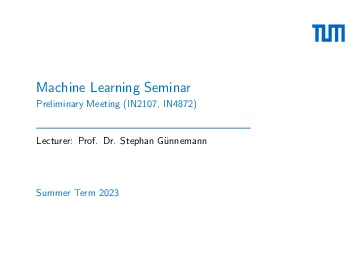Seminar - Selected Topics in Machine Learning Research

Seminar - Selected Topics in Machine Learning Research (IN2107, IN4872)
Application
The pre-course meeting with information regarding the course format, possible topics etc. is scheduled for Feb 7, 2023 1pm on zoom (Passcode: 269789).
Note that you have to register via the matching system and fill out our application form to apply for a spot!
Schedule
- Pre-course meeting: Feb 7, 2023 1pm - slides
- Kick-off meeting: Apr 17, 2023 9am
- Final presentations: Jul 18 & 19, 2023 (whole day)
Prerequisites
This seminar is intended for Master's students only. You should have attended (and passed) the Machine Learning lecture (IN2064). Having attended Machine Learning for Graphs and Sequential Data (IN2323) or other advanced ML/DL lectures (IN2332, IN2346, etc.) is a plus.
Description
The amount of research in machine learning has grown exponentially in the last couple of years, uncovering many promising and successful research directions. In this seminar we will select and discuss a diverse set of topics of current research. This seminar will let students get acquainted with current machine learning research, let them explore new fields and ideas and let them analyze and criticize recent publications.
To do so, each student will receive 2-5 research papers which they should carefully read and analyze. Starting from these they should explore the surrounding literature and summarize their findings, criticism, and research ideas in a 4-page paper (double column). The students will then review each other's work to give valuable feedback and criticism. Finally, all students will prepare 20-minute presentations and present their work (with a subsequent discussion round) during a block seminar at the end of the semester.
Possible topics (preliminary)
- (Adversarial) Robustness
- Adversarial Training of Deep Neural Networks
- Randomized Smoothing: Limitations of the Standard Approach
- Randomized Smoothing: Recent Advances
- (Random) Lipschitz Neural Networks
- Modern Architectures & Training
- Efficient Transformers
- Learning-free Neural Architecture Search
- Approximate Second-Order Optimization
- Model-based Meta-Learning
- ML & Graphs
- Understanding Graph Neural Networks using Random Graph Models
- Graph Neural PDEs
- Semi-supervised Learning for Graph Classification
- Active Learning on Node Level
- Robust ML & Graphs
- Poisoning Attacks and Defenses for Graph Neural Networks
- Robustness Certificates for Graph Neural Networks
- Randomized Smoothing beyond Images (Graphs, etc.)
- Distribution Shifts on Graphs